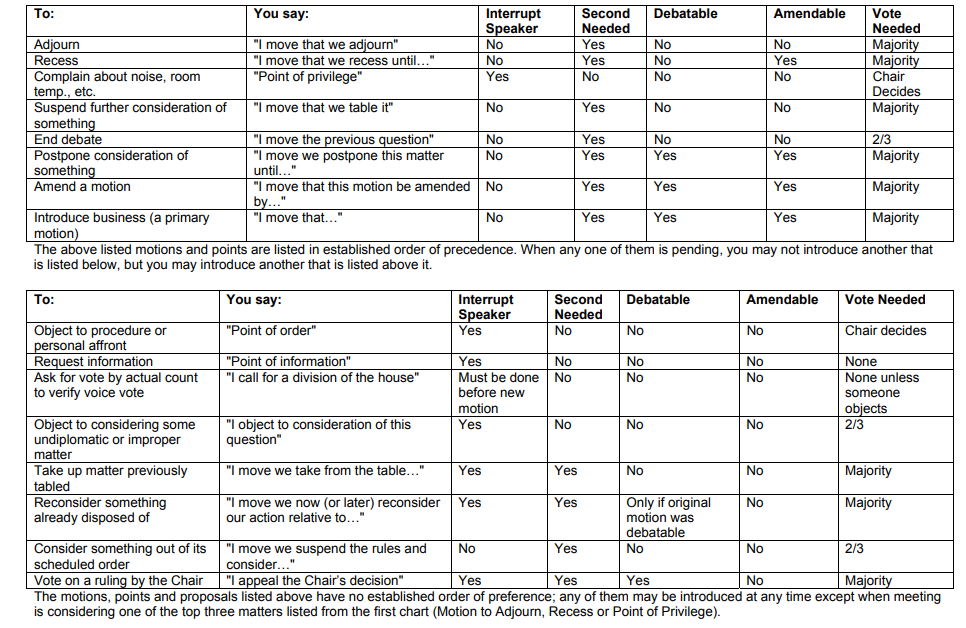It is no secret that the Establishment uses red tape, rules, confusion, corrupt parliamentarians, and other tactics to silence the voice of the people. By becoming an Expert in Robert’s Rules of Order, you can take back this power and refuse to be silenced. At the bottom is a handy Quick Guide you can use and some additional information here and below:
- PDF Roberts Rules of Order CheatSheet
- PDF Roberts Rules of Order Basics
- Roberts Rules of Order Motion Flow Chart
Video Roberts Rules of Order Training
Video Origins of Roberts Rules of Order and Other Specific Questions
PROXIES
Proxy Votes are NOT counted in a voice vote or rising vote as was modeled at the State Committeeman meeting. This specific question was asked and proxy votes are not counted in this type of vote.
#45:2 One Person, One Vote. It is a fundamental principle of parliamentary law that each person who is a member of a deliberative assembly is entitled to one-and only one- vote on a question.
#45:56 Absentee Voting. It is a fundamental Principle of parliamentary law that the right to vote is limited to the members of an organization who are actually present at the time the vote is taken in a regular or properly called meeting…
45:70 Proxy Voting. A proxy is a power of attorney given by one person to another to vote in his stead; the term also designates the person who holds the power of attorney. Proxy voting is not permitted in ordinary deliberative assemblies unless the laws of the state in which the society is incorporated require it, or the charter or bylaws of the organization provide for it. Ordinarily it should neither be allowed nor required, because proxy voting is incompatible with the essential characteristics of a deliberative assembly…
OBTAINING AND ASSIGNING THE FLOOR
#3:30 Before a member in an assembly can make a motion or speak in debate-the parliamentary name given to any form of discussion of the merits of a motion-he must obtain the floor, that is he must be recognized by the chair as having the exclusive rights to be heard at that time. The chair must recognize any member who seeks the floor while entitled to it.
MOTIONS WHICH ARE IN ORDER WHEN ANOTHER HAS THE FLOOR AND DO NOT REQUIRE A SECOND
t44-t45
- Parliamentary Inquiry 33:3-5
- Point of Order 23
- Request for Information 33:6-10
OUT OF ORDER
#4:17 When a member who has legitimately obtained the floor offers a motion which is not in order, the chair may be able, in certain instances, to suggest an alternative motion which would be in order and would carry out the desired intent to the satisfaction of the maker. If the chair is obliged to rule that the motion is not in order, he says, “The chair rules that the motion is not in order because [briefly stating the reason] He must not say “You are out of order,” nor, “Your motion is out of order.” To state that a member is out of order implies that the member is guilty of a bread of decorum or other misconduct; and even in such a case, the chair does not normally address the member in the second person. If the chair rules that a motion is not in order, his decision is subject to an appeal of the judgement of the assembly.
APPEAL
#24:1 By electing a presiding officer, the assembly delegates to him the authority and duty to make necessary rulings on questions of parliamentary law. But any two members have the right to Appeal from his decision on such a question. By one member making the appeal and another seconding it, the question is taken from the chair and vested in the assembly for final decision.
DECORUM
#61:15 The case may be sufficiently resolved by an apology or a withdrawal of objectionable statements or remarks by the offender;
#61:11 Calling a member to order. “-as when a member repeatedly questions the motives of other members whom he mentions by name…” “-the chair normally should first warn the member; but with or without such a warning, the chair or any other member can “call the member to order.”, #61:12 Naming an offender
REMOVAL FROM THE HALL
#61:13 Although the chair has no authority to impose a penalty or to order the offending member removed from the hall, the assembly has that power.
#61:16 The offending member can be required to leave the hall during the consideration of his penalty, but he must be allowed to present his defense briefly first. A motion to require the member’s departure during consideration of the penalty- which may be assumed by the chair if he things it appropriate- is undebatable, is unamendable, and requires a majority vote.


Hi Brian: I’ve printed this out and I’m going to study it. I’ve never experience a meeting run so well with explanations like we did last night. It really was incredible, the rules and the order. Thank you for your efforts to get us where we are. Tracey Grossman/Carefree PC
Hi Brian! This is great! Can you do a walk thru for Dummies lol, and people who aren’t on this channel. I think we could all learn a lot. Thanks
This is excellent! One point: if we had a local organization in every area — a group which met regularly and was made up of ‘activists’, only one of them (with a ‘second’, since you shold always be training your replacement) would need to become an ‘expert’ in Roberts’ Rules. (The same goes for the other specialities a group like this should have: intel, medical, engineering, transport/logistics, legal, PR/outreach, etc.) It’s how the human race pulled itself up from the bottom: specialization and the division of labor.